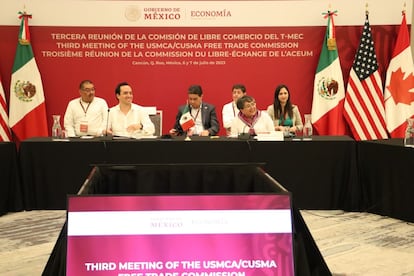Tariffs, unions and GM corn: the US, Mexico and Canada try to iron out USMCA trade disputes
Representatives of the three countries are to meet in Arizona to discuss the challenges of North American economic integration against the background of presidential elections and the trade war with China

Mexico, the United States and Canada are preparing the ground for the first six-year review of their free trade agreement, the USMCA, which was signed in 2018 and went into effect in 2020, replacing NAFTA. This week, trade representatives from all three countries will meet in Phoenix, Arizona for the fourth meeting of the agreement’s Free Trade Commission. The meeting between U.S. Trade Representative Katherine Tai, Mexico’s Secretary of the Economy Raquel Buenrostro, and the Canadian Minister of Export Promotion, International Trade and Economic Development, Mary Ng, will be held behind closed doors, but a joint statement is expected afterwards.
The trilateral gathering is not a minor issue as two of the member states gear up for presidential elections. Representatives will be dealing with tensions over an increase in tariffs, a rise in Chinese imports to Mexico, and the fight over the Mexican government’s veto of genetically modified corn.
The event will be marked by the hike in tariffs recently announced by the U.S. government on a range of Chinese imports — including solar panels, electric vehicles and their batteries — a measure that represents a warning to stop any type of commercial triangulation through Mexico. Earlier this month, Tai said China’s use of Mexico as an alternative solution was “something they were talking about” with industry and workers. The Biden Administration has imposed a 102% tariff on Chinese electric vehicles, in addition to imposing new tariffs on other products, including steel, aluminum, computer chips and solar cells. The Biden Administration suggested the possibility of additional sanctions if Chinese electric vehicle manufacturers try to move their production to Mexico to avoid recently announced import taxes.
With this decision, Biden has escalated the trade war with the Asian economy and, incidentally, with the previous USMCA agreements, against the backdrop of Mexico’s growth as the main exporter to the United States, above China. According to official data, the Latin American country has become America’s most important trading partner, being the country from which the United States bought the most goods and services in 2023. The reasons, however, have less to do with Mexico and more to do with the geopolitical tensions of the moment. The United States wants to stop buying from China and Mexico is fighting for a slice of that pie.
Another issue on the table will be the labor conditions of Mexican companies with ties to the United States. The new complaint mechanisms to warn about alleged workplace violations have already been used by more than a dozen workers to denounce alleged abuses of their union rights. The United States has at least five cases open against Mexico under the USMCA’s Facility-Specific Rapid Response Labor Mechanism; there is also an ongoing procedure against a Spanish call center with operations in Pachuca, Hidalgo.
Mexico will also be defending its ban on the human consumption of genetically modified corn, a move that threatens to block more than 400,000 tons of grain that the United States exports to Mexico. Canada has joined the U.S. in this dispute, which will be resolved in a trade dispute panel under the auspices of the USMCA. Just like the United States, Canada has criticized the measure taken by the López Obrador Administration, asserting that the measure is not scientifically supported and that it threatens to stop trade flows between the three countries.
Mexico and Canada are the two main export destinations for the U.S. Last year alone, trade flows in North America reached more than $1.8 trillion and the majority of trade was conducted by small businesses, according to official data. SMEs exported more than $83 billion in goods to Canada, more than $49 billion to the United States, and more than $110 billion to Mexico. Investments in each other’s economies amounted to nearly $1.2 trillion in 2022, including small business supply chains.
Sign up for our weekly newsletter to get more English-language news coverage from EL PAÍS USA Edition
Tu suscripción se está usando en otro dispositivo
¿Quieres añadir otro usuario a tu suscripción?
Si continúas leyendo en este dispositivo, no se podrá leer en el otro.
FlechaTu suscripción se está usando en otro dispositivo y solo puedes acceder a EL PAÍS desde un dispositivo a la vez.
Si quieres compartir tu cuenta, cambia tu suscripción a la modalidad Premium, así podrás añadir otro usuario. Cada uno accederá con su propia cuenta de email, lo que os permitirá personalizar vuestra experiencia en EL PAÍS.
¿Tienes una suscripción de empresa? Accede aquí para contratar más cuentas.
En el caso de no saber quién está usando tu cuenta, te recomendamos cambiar tu contraseña aquí.
Si decides continuar compartiendo tu cuenta, este mensaje se mostrará en tu dispositivo y en el de la otra persona que está usando tu cuenta de forma indefinida, afectando a tu experiencia de lectura. Puedes consultar aquí los términos y condiciones de la suscripción digital.









































